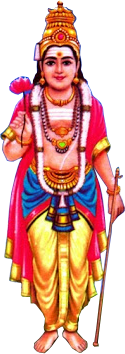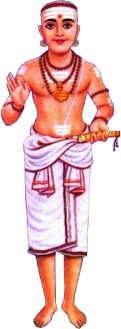63 Nayanmargal
- Adipattha Nayanar-அதிபத்த நாயனார்
- Aiyadigal Kadavarkon Nayanar-ஐயடிகள் காடவர்கோன் நாயனார்
- Amaraneedi Nayanar-அமர்நீதி நாயனார்
- Anaya Nayanar-ஆனாய நாயனார்
- Appuddi Nayanar-அப்பூதி அடிகள் நாயனார்
- Arivattaya Nayanar-அரிவாள் தாய நாயனார்
- Chandesvara Nayanar-சண்டேசுவர நாயனார்
- Cheraman Perumal Nayanar-செராமான் பெருமாள் நாயனார்
- Dandi Adigal Nayanar-தண்டியடிகள் நாயனார்
- Enadinatha Nayanar-ஏனாதிநாத நாயனார்
- Eripatha Nayanar-எறிபத்த நாயனார்
- Eyarkon Kalikama Nayanar-ஏயர்கோன் கலிக்காம நாயனார்
- Gananatha Nayanar-கணநாத நாயனார்
- Idangazhi Nayanar-இடங்கழி நாயனார்
- Ilayankudi Mara Nayanar-இளையான்குடி மாறநாயனார்
- Isaijnaniyar-இசை ஞானியார்
- Iyarpahai Nayanar-இயற்பகை நாயனார்
- Kalia Nayanar-கலிய நாயனார்
- Kalikamba Nayanar-கலிக்கம்ப நாயனார்
- Kanampulla Nayanar-கணம்புல்ல நாயனார்
- Kannappa Nayanar-கண்ணப்ப நாயனார்
- Karaikal Ammaiyar-காரைக்கால் அம்மையார்
- Kari Nayanar-காரி நாயனார்
- Kazharsinga Nayanar-கழற்சிங்க நாயனார்
- Kochengat Chola Nayanar-கோச்செங்கட் சோழ நாயனார்
- Kootruva Nayanar-கூற்றுவ நாயனார்
- Kotpuli Nayanar-கோட்புலி நாயனார்
- Kulacchirai Nayanar-குலச்சிறை நாயனார்
- Kungiliya Kalaya Nayanar-குங்குலியக் கலய நாயனார்
- Maiporul Nayanar-மெய்ப்பொருள் நாயனார்
- Manakanchara Nayanar-மானக்கஞ்சாற நாயனார்
- Mangayarkarasiyar-மங்கையர்க்கரசியார்
- Munaiyaduvar Nayanar-முனையடுவார் நாயனார்
- Murkha Nayanar-மூர்க்க நாயனார்
- Murthi Nayanar-மூர்த்தி நாயனார்
- Muruga Nayanar-முருக நாயனார்
- Nami Nandi Adigal-நமிநந்தியடிகள் நாயனார்
- Narasinga Muniyaraiyar-நரசிங்க முனையரைய நாயனார்
- Nesa Nayanar-நேச நாயனார்
- Ninra Seer Nedumara Nayanar-நின்றசீர் நெடுமாற நாயனார்
- Perumizhalai Kurumba Nayanar-பெருமிழலைக் குறும்ப நாயனார்
- Pugal Chola Nayanar-புகழ்ச்சோழ நாயனார்
- Pugazh Tunai Nayanar-புகழ்த்துணை நாயனார்
- Pusalar Nayanar-பூசலார் நாயனார்
- Rudra Pasupathi Nayanar-உருத்திர பசுபதி நாயனார்
- Sadaya Nayanar-சடைய நாயனார்
- Sakkiya Nayanar-சாக்கிய நாயனார்
- Satti Nayanar-சத்தி நாயனார்
- Seruthunai Nayanar-செருத்துணை நாயனார்
- Sirappuli Nayanar-சிறப்புலி நாயனார்
- Siruthonda Nayanar-சிறுத்தொண்ட நாயனார்
- Somasira Nayanar-சோமாசி மாற நாயனார்
- Sundaramurthi Nayanar-சுந்தரர்
- Tirugyanan Sambandar-திருஞான சம்பந்த மூர்த்தி நாயனார்
- Tiru Kurippu Thonda Nayanar-திருக்குறிப்புத் தொண்ட நாயனார்
- Tirumula Nayanar-திருமூல நாயனார்
- Tiru Nalai Povar Nayanar-திருநாளைப் போவார் நாயனார்
- Tiru Neelakanta Nayanar-திருநீலகண்ட நாயனார்
- Tiru Neelakanta Yazhpanar-நீலகண்ட யாழ்ப்பாண நாயனார்
- Tiru-Navukkarasar Nayanar (a) Appar-திருநாவுக்கரசு நாயனார்
- Tiruneelanakka Nayanar-நீல நக்க நாயனார்
- Vayilar Nayanar-வாயிலார் நாயனார்
- Viralminda Nayanar-விறல்மிண்ட நாயனார்
Siruthonda Nayanar
In Tiruchenkattangudi in the Chola kingdom, there lived a Siva Bhakta by name Paranjyoti. His was a family of army commanders. He himself was the Commander-in-Chief of the Chola king. He realised that devotion to the Feet of Lord Siva was the best means of obtaining Liberation from Samsara and so, he clung to Them.Once, at the instance of his king, he waged war with a North Indian king, defeated him and returned with a big booty. The king was highly pleased. The minister informed the king that Paranjyotiar was able to achieve the victory because of his intense devotion to Lord Siva. This shocked the king, who was a Siva Bhakta himself: he regretted having compelled a Siva Bhakta to wage a bloody war. He called Paranjyotiar, apologised for having sent him, a Siva Bhakta to war, and, after giving him rich presents, sent him back to his village, with the request that he should henceforth engage himself in His Puja. Paranjyotiar returned to his village and from that time was engaged in the worship of the Lord and His Bhaktas. He would not eat without first feeding a Siva Bhakta. He regarded himself as the lowly servant of the Lord and His Bhaktas: hence the name Siruthondar (small servant).
Lord Siva wanted to bring out the glory of this noble saint. So, one day He appeared in front of Siruthondars house, in the guise of a Vairavar (a special class of Siva Yogis). He enquired of Siruthondars maid-servant, Sandana Nangaiyar, whether her master was at home. She said: No, he has gone in search of a Siva Bhakta, without feeding whom he would not take his food. But, afraid lest this Siva Yogi should go away, she entreated him to come into the house. The mendicant would not: I shall not enter the house in which a woman is alone. Siruthondars wife Tiruvengattu Nangaiyar heard these words and came out hurriedly and prayed to the Vairavar to stay in the house till the husband returned. The Vairavar repeated his objection and said: When he comes back tell him I am under the tree near the temple. The Vairavar went away.
Immediately afterwards, Siruthondar returned. His wife told him all that had happened in his absence. Siruthondar was overjoyed because he was unable to find any other Bhakta that day. At once he ran to the temple and fell at the feet of the Vairavar and invited him to the house for Bhiksha. The Vairavar, however, hesitated and remarked: I doubt whether you will be able to fulfil the exacting conditions I shall demand for accepting your Bhiksha: so, better leave me alone. Siruthondar was greatly grieved. He had thought that this mendicant had been specially sent by God to enable him to adhere to his vow and feed a Bhakta every day. He was prepared to meet any demand from the Bhakta, if only he agreed to take the Bhiksha. Now, the mendicant revealed his condition: Oh devotee, it is my habit to eat once in six months the fresh meat of a Pasu. That time has now come. I doubt whether you will satisfy me. This word Pasu has two meanings: an animal and a human being. Siruthondar thought that the mendicant only meant animal meat: and readily agreed! To his surprise, however, the mendicant revealed that meant human flesh! He also added: Oh friend, it should be the meat of a child. The child should be five years of age. He must be healthy. He should be the only son of his parents. Such a boy must be held by the mother and cut into pieces by his father. This meat must be cooked nicely and offered to me. Without the least hesitation, Siruthondar accepted conditions and took the mendicant home.
How to find a boy of the mendicants description? Siruthondar thought of his own son who fitted the description. The noble wife agreed, too, and asked him to get the child from school. As soon as he came the mother held him on her lap. The innocent child was laughing when Siruthondar, with one stroke cut his throat. The head is generally unfit for cooking, and is not fit for being offered to the Lord. So, they gave it away to the maid-servant and began to cook, the rest of the meat. After worshipping the mendicant, Siruthondar was preparing to offer him Bhiksha. The mendicant ascertained the method adopted by them in cooking the meat and Nayanar explained everything (except the fact that it was their own son that they had sacrificed). The mendicant said he would eat the head, too. The maid-servant had anticipated this and had the head cooked and ready.
Once again, Siruthondar requested the Yogi to have his meal. Now, the Yogi wanted another Siva Bhakta to eat with him: and there was no one except the Nayanar himself. So, he sat with the Yogi, ready to eat the flesh of his son, to please the Yogi. Yet, one more condition had to be fulfilled! The Yogi said that unless the hosts son ate with him, he would not eat! Nayanar tactfully explained that his son was not in the house and so could not join with them. But, the Yogi insisted: Go out and call for him: he will come. Nayanar wanted to obey the Yogi and did as the Yogi had asked to do. Wonder of wonders: the young boy came running to the father as soon as the father had cried aloud: Sirala, come here: the Yogi wants you to eat with him. The parents were astonished to see their child, Siralan come back to life. They entered the kitchen, but could not find the Yogi there. The meat had also disappeared! As they were searching for the Yogi, the Lord appeared before them, blessed them and took them to His Abode.









